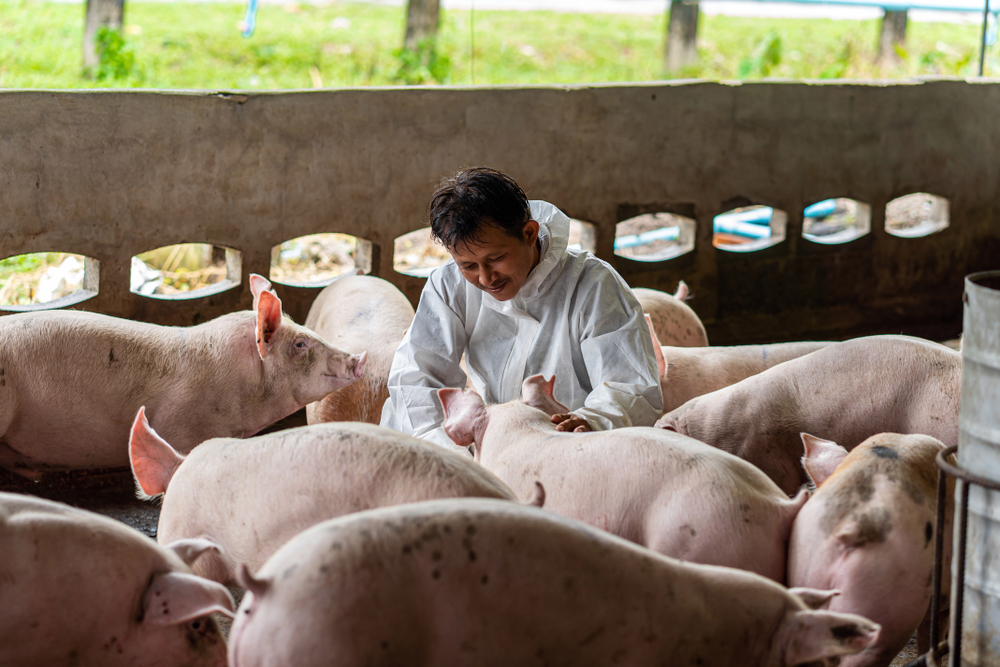Recently, pigs containing the African Swine Fever Virus were found as part of an export product from Indonesia livestock to Singapore. In this article, we answer what this virus is and why it is dangerous.
What is African Swing Fever?
African Swine Fever (ASF) is a highly contagious and deadly viral disease affecting both domestic and wild pigs. First identified in Africa in the early 20th century, ASF has since spread to multiple continents, posing a significant threat to the global pig population and the pork industry. While ASF poses no direct threat to human health, its far-reaching consequences can indirectly impact human well-being.
Transmission: How ASF Spreads Among Pigs
ASF is caused by the African Swine Fever virus (ASFV), a large DNA virus belonging to the Asfarviridae family. The virus spreads through direct contact between infected and healthy pigs. Also, it spreads through indirect contact with contaminated objects, such as clothing, equipment, and vehicles. Additionally, ASFV can be transmitted by ticks of the genus Ornithodoros, which act as vectors and reservoirs for the virus.
Importantly, ASF poses no direct threat to human health, as it only infects pigs. However, humans can play a role in the spread of the virus through the movement of contaminated objects or the illegal trade of infected pork products.
Symptoms: The Telltale Signs of African Swine Fever
The clinical signs of ASF can vary depending on the strain of the virus and the susceptibility of the infected pigs. Symptoms may range from mild to severe and can include:
- High fever
- Loss of appetite
- Lethargy
- Red or darkened skin, particularly around the ears, snout, and limbs
- Vomiting and diarrhoea
- Respiratory distress
- Sudden death
In severe cases, the mortality rate of ASF can reach 100%. Infected pigs often die within a few days to two weeks after the onset of symptoms.
Indirect Medical Impact on Humans: A Closer Look
- Food safety and security: ASF outbreaks can lead to reduced pork production and increased food safety concerns. Consequently, disruptions in the supply chain can result in limited availability and higher prices for pork products. In countries where pork is a staple food, this can contribute to food insecurity and negatively affect human nutrition.
- Livelihood and mental health: The devastating impact of ASF on pig farming can have significant socioeconomic repercussions. This is particularly felt for small-scale farmers in developing countries. The loss of income and livelihood can lead to increased stress, anxiety, and depression among affected communities, thereby indirectly affecting human mental health.
- Zoonotic disease prevention: Although ASF is not a zoonotic disease, the measures taken to control its spread can help in raising awareness and preparedness for other zoonotic diseases that can directly impact human health. Implementing enhanced biosecurity measures and conducting public awareness campaigns are effective ways to prevent the transmission of other zoonotic diseases from animals to humans.
- Antibiotic resistance: The indirect impact of ASF on human health can be linked to the increased use of antibiotics in the pig farming industry. With the rise in demand for disease-resistant pigs, the overuse of antibiotics can contribute to the development of antibiotic-resistant bacteria. This can pose a significant risk to human health.
Control Measures: Tackling the Threat of ASF
Preventing and controlling the spread of the virus is crucial due to the lack of an effective vaccine or treatment for ASF. Managing ASF involves implementing key strategies such as:
- Strict biosecurity measures: Implementing rigorous hygiene practices on pig farms, such as disinfection, controlled access to facilities, and proper disposal of waste, can help prevent the introduction and spread of the virus.
- Early detection and reporting: Regular monitoring of pig health and prompt reporting of suspected ASF cases to the relevant authorities can aid in early detection and swift response to outbreaks.
- Culling and disposal of infected pigs: The humane culling and safe disposal of infected pigs and their carcasses is essential in controlling the spread of ASF.
- Movement control: Restricting the movement of pigs, pork products, and potentially contaminated objects can help prevent the dissemination of the virus to new areas.
- Public awareness and education: Raising awareness about ASF and promoting responsible practices among pig farmers, traders, and consumers can play a crucial role in preventing the spread of the disease.
Conclusion: Confronting the Challenge of African Swine Fever
While African Swine Fever does not directly affect human health, its consequences can have far-reaching indirect implications. The disruption of the pork industry, the impact on the livelihoods of small-scale farmers, and the potential for increased antibiotic resistance all pose challenges to human well-being. It is possible to mitigate the negative effects of this disease on both pigs and humans. However, we must understand the transmission, symptoms, and indirect medical impact of ASF.














